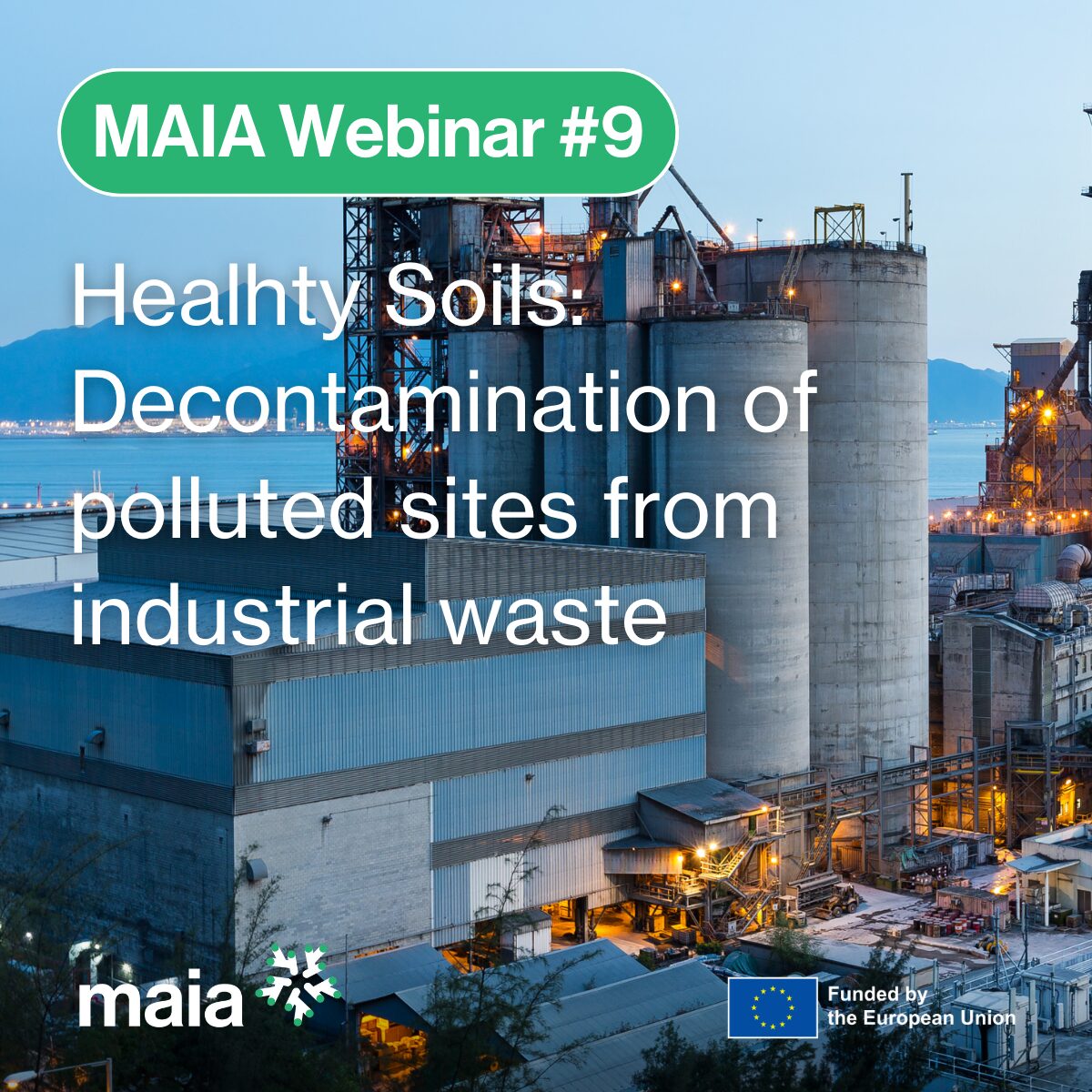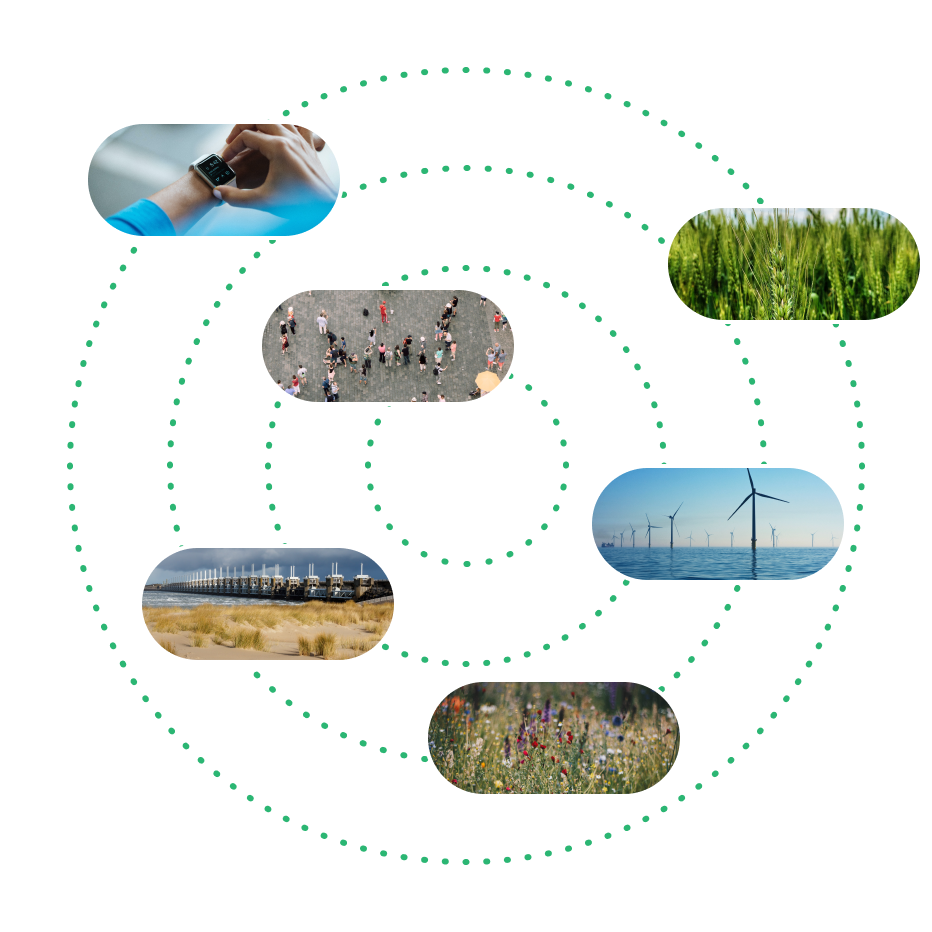Lessons Learned from Webinar: Healthy Soils: Decontamination of polluted sites from industrial waste

The MAIA Webinar “Healthy Soils: Decontamination of Polluted Sites from Industrial Waste” took place on October 13, featuring representatives from the following projects:
MIBIREM – Innovative Toolbox for Microbiome-based Soil Remediation. (www.mibirem.eu)
Represented by Thomas Reixhenauer (Austrian Institute of Technology – AIT), it is a Horizon Europe project with a projected duration of 4.5 years and involves 11 partners from 6 different EU countries. Considering the substantial number of severely contaminated sites in Europe, MIBIREM develops molecular methods for the monitoring, isolation, cultivation, and subsequent deposition of whole microbiomes. The MIBIREM toolbox (software) offers innovative methods for utilizing the potential of microbiomes to degrade contaminants in soil and groundwater, based on environmental parameters.
The MIBIREM project is expected to deliver the following key results:
- The MIBIREM toolbox that combines and aligns existing and new tools, from sampling to piloting, in a complete service package for microbiome bioremediation, which includes:
- Handbook for standardised sampling
- Improved and innovative methods for the isolation, cultivation, evolution & enrichment of microbiomes
- A modelling prediction tool for bioremediation
- 3 pilot tests demonstrating the power of the MIBIREM toolbox in producing safe, upscaled, affordable and effective bioremediation.
- Modified microbiomes for bioremediation
- Public deposit of 300 sequenced, documented bioremediation strains, as well as a public deposit of several bioremediation microbiomes with high degradation capacity
- New standards for a quality-controlled deposit, preservation and distribution of bioremediation consortia
- Novel soil bac-traps to capture pollutant-degrading bacteria
- Policy recommendations to stimulate the uptake of bioremediation in the EU.

https://www.mibirem.eu/wp-content/uploads/2023/03/Flyer_Mibirem_web.pdf
ReSoil (http://www.envit.si/)
Represented by Grega E. Voglar (ENVIT Ltd.), ReSoil is supported, among others, by the Horizon 2020 program and represents a groundbreaking remediation solution that enables the closed-loop removal of heavy metals from contaminated soils through a zero-emission process with no wastewater, all while preserving the soil as a natural substrate. Based on advanced EDTA (ethylenediamine tetraacetate) soil washing, ReSoil is the world’s only technology that simultaneously removes toxic metals and metalloids from the soil with cost efficiency and environmental sustainability.
ReSoil® is groundbreaking patented remediation solution that enables closed-loop removal of heavy metals from contaminated soils through a zero-emission process with no wastewater, while preserving soil as a natural substrate.
Case Studies:
Remediation case #1: City of Prevalje, Meza Valley, Slovenia
Remediation case #2: city of Arnoldstein, Austria
Remediation case #3: city of Celje, Slovenia
Remediation case #4: POSIDON | POLLUTED SITE DECONTAMINATION PCP
Remediation case #5: Removal of toxic metals from sewage sludge by EDTA in a closed-loop washing process
Remediation case #6: Project V1-2280

http://www.envit.si/resoil-in-brief
POSIDON | Polluted Site Decontamination PCP (www.posidonproject.eu)
Represented by Martina Terconi (Area Science Park), POSIDON brings together 5 European procurers from 4 different European countries with the aim of identifying new, cost-effective, life-cycle soil remediation technologies capable of simultaneously decontaminating organic and inorganic contaminants in heterogeneous anthropic soils in brownfields. These soils are composed of a mixture of industrial waste and soils consisting of clays and sands, and they are highly polluted by petroleum, hydrocarbons, and heavy metals.
Through a joint Pre-Commercial Procurement (PCP), it aims to procuring applied research and technological development services. It involves different suppliers competing in parallel through different phases of development: solution design, prototype development, original development of (at least) 2 prototypes (per each bidder) to be field-tested in 2 diverse sites (Bilbao and Trieste), with different urbanistic provisions that foresee future land uses.

Source: https://www.posidonproject.eu/wp-content/uploads/2018/06/POSIDON-PCP-leaflet.pdf
- Get to know the POSIDON PCP front runner procurers
Lessons Learned
- MIBIREM shows that many organic contaminants in the soil are difficult to remove, and conventional remediation technologies are often too costly, technically demanding, and not environmentally friendly. In this context, bioremediation has the potential to be considered an innovative cleaning technology because it utilizes living organisms, primarily microbes like bacteria, to eliminate environmental contaminants at lower costs and with environmental friendliness.
- Bioremediation is 20-50% cheaper than current practices and emits 70-90% less CO2 emissions than conventional remediation technologies.
- The bioremediation market has huge potential, growing 105% faster than the conventional remediation market.
- Case studies indicate, among other findings, a reduction of up to 95% in lead (Pb) concentration and 50% to 70% in mercury (Cu) concentration in the soil through the use of ReSoil, providing safe conditions for agriculture and more.
- Recently, the EU Commission adopted the New EU Soil Monitoring Law, which provides a legal framework to help achieve healthy soils by 2050.
- POSIDON permits: transitioning from traditional “push” and “market-driven” innovation strategies and investments to “pull” and “demand-driven” approaches; addressing the fragmentation of public demand through transnational aggregation, optimizing the cost and value of R&D; unlocking the internal market by providing concrete cross-border market and growth opportunities for companies; and allowing participating companies to retain IPR ownership rights in exchange for financial compensation.
- Multiple sourcing and the separation between development and large-scale deployment are beneficial for developing a more competitive market, enhancing incentives to strive for improved performance.
- Gradually increasing contract sizes facilitate the access of small innovative enterprises to the market.
- A virtuous process of co-evolution of demand and supply shortens the time-to-market for suppliers that can better anticipate the demand for new solutions.
- Allowing companies to retain Intellectual Property Rights (IPR) ownership encourages them to pursue wider commercialization, which, in turn, provides additional contractual incentives for further R&D efforts.
How you can get involved
MIBIREM

Website: www.mibirem.eu
Twitter: https://twitter.com/mibirem
LinkedIn: https://www.linkedin.com/company/mibirem/
Youtube: https://www.youtube.com/@mibiremeu
ReSoil

Website: http://www.envit.si/
Twitter: https://twitter.com/envitltd
LinkedIn: https://si.linkedin.com/company/envit
Youtube: https://www.youtube.com/channel/UCNoq64TvmGHiUs1mku-6wIg
POSIDON

Website: www.posidonproject.eu
Videos: https://www.posidonproject.eu/info-results/

(0) Comments
There is no contentYou must be logged in to reply.